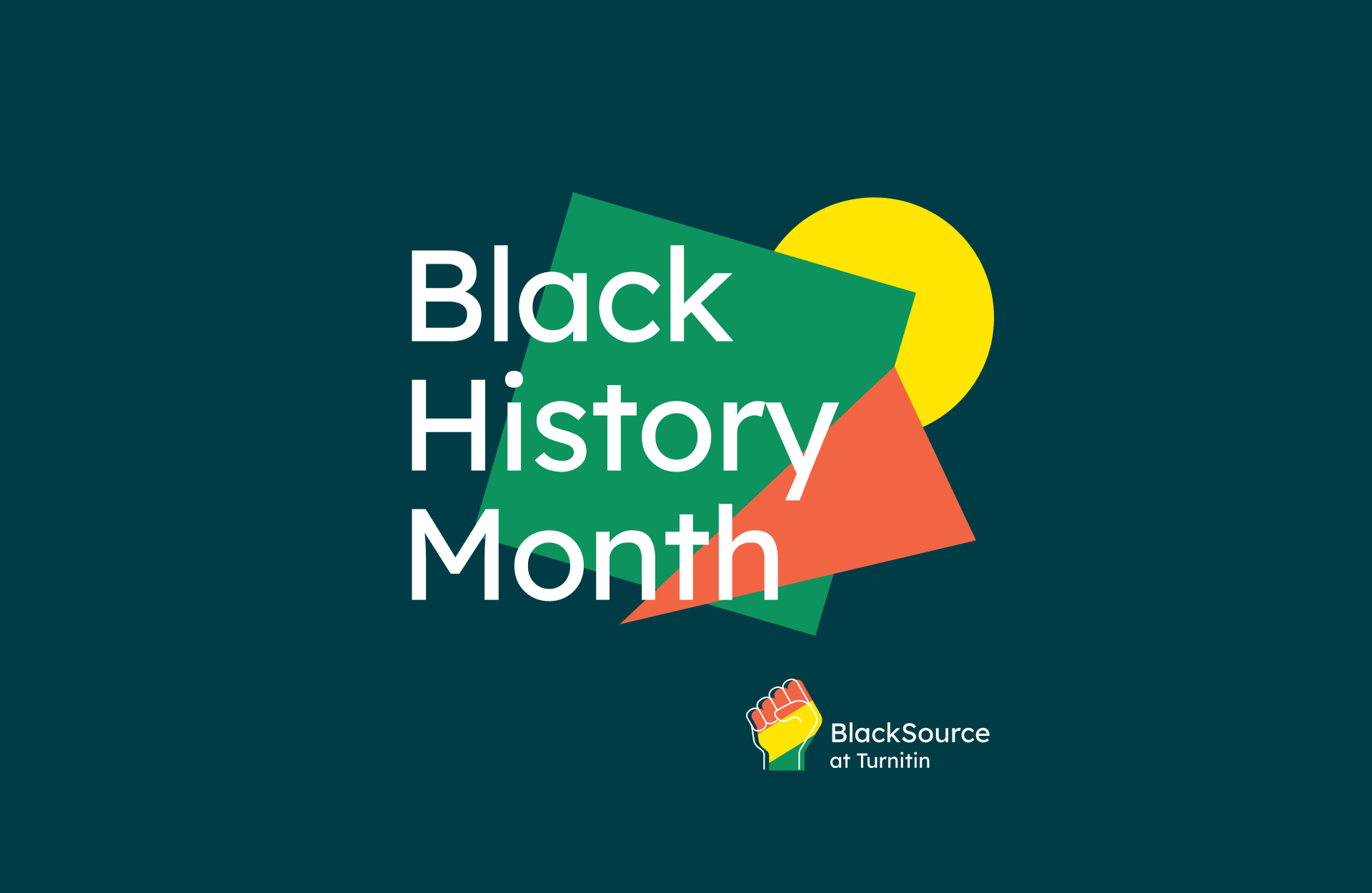This past month was Black History Month in the United States, an opportune time to reflect on the profound contributions of African Americans to the fabric of American society, to recognize the ongoing struggles for justice and equality, and to understand the relevance of these narratives in our current societal context. It was a month that asked us to not only look back at the past, but to acknowledge how Black history informs and shapes our present and future.
In 1976, President Gerald Ford officially recognized Black History Month, calling upon the public to "seize the opportunity to honor the too-often neglected accomplishments of Black Americans in every area of endeavor throughout our history."
Here at Turnitin, we honored this month in a variety of ways; led by BlackSource, our Employee Resource Group (ERG) for employees of Black and African Descent, we came together as BIPOC employees and allies to converse, collaborate, discover, and remember. And as this important month comes to a close, we’d like to reflect on a few things we learned this month that will stay with us even beyond the arrival of March.
We learned about the undeniable impact that Black individuals have had on all artistic fields, including music, literature, fashion, and more.
The theme for Black History Month in 2024 was "African Americans and the Arts," emphasizing the significant impact African Americans have had in various artistic fields. This theme underscores the importance of the arts in cultural expression and societal development.
The Association for the Study of African American Life and History (ASALH) offered us context for this year’s theme, diving into the stories of Black individuals who have made their mark. From the musical styles of McKinley ‘Muddy Waters’ Morganfield, Riley “BB” B. King, Jimi Hendrix, and Janelle Monáe, to the literary influences of Langston Hughes, Frantz Fanon, Toni Morrison, and Octavia Butler, we gained a deeper appreciation of the richness and extent of these artists’ legacies. We watched Marvel’s “Black Panther” and Cord Jefferson’s “American Fiction”, and we were amazed by the visual worlds of British-Liberian painter Lina Iris Viktor and Kenyan-born sculptor Wangechi Mutu. To honor these artists goes beyond acknowledging how their work has shaped American culture; the true learnings for us centered on how art has been and will continue to be a powerful medium for advocacy and social change.
We learned that there still is important work to be done to forward racial and health equity in this country.
Navigating the American healthcare system can be particularly challenging for Black individuals due to a confluence of systemic, structural, and social factors deeply rooted in historical and ongoing racism and discrimination. The ongoing global health crisis has brought to light significant health disparities that disproportionately affect Black communities. African Americans are more likely to suffer from and die of conditions such as heart disease, diabetes, and cancer. Maternal and infant mortality rates are significantly higher among African Americans, and this group is also more likely to experience death from gun violence, particularly among children, according to Jamila Taylor, the Former Director of Health Care Reform and Senior Fellow with the Century Foundation.
This year, the focus is on recognizing these disparities and promoting policies and practices that aim to achieve health equity. It’s crucial that everyone is aware of the inequities that exist in healthcare reform, and we’re doing what we can to educate ourselves at the local and federal level. As such, our Turnitin BlackSource ERG hosted a session this month with Modern Health, specifically focused on the self-care and wellbeing of the Black community. It’s clear that addressing these challenges requires a multifaceted approach that includes policy changes, expansion of healthcare access, elimination of discriminatory practices in healthcare delivery, and targeted efforts to address the social determinants of health that disproportionately affect African Americans.
We learned that “Excellence can look like anybody.”
Esteemed Turnitin Board Member and President of Rutgers University, Dr. Jonathan Holloway, sat down with members of our BlackSource ERG and over 150 Turnitin employees for a virtual conversation that covered everything from the use of AI-generative tools in the classroom to Diversity, Equity, Inclusion, and Belonging (DEIB) initiatives in higher education.
Dr. Holloway spoke openly and honestly about his initial hesitation to embrace AI, joking that he identifies as a “luddite” despite leading a university team in the digital age. He’s come around, however, and recognizes that “AI properly deployed by faculty can be a powerful assistant helping people to learn how to write better.”
When it came to the topic of DEIB, Dr. Holloway spoke passionately about supporting opportunities for all students to find success. “DEIB isn’t saying, ‘Everybody gets the same thing at the end of the day.’ It’s saying, ‘Everyone gets the same chance to start. The starting line for everyone is at the same place.’” He emphasized the value of discourse, staying curious, and the deepest of truths that “excellence can look like anybody.”
In sum: The relevance today of Black History Month
Roxanne Ford, the VP of Global People Partnerships at Turnitin and our BlackSource ERG’s People Team Advisor, asked employees at the start of the month to lean in to Senator John Lewis' powerful words, "get in good trouble, necessary trouble". She invited everyone to explore how Black individuals and communities have courageously pushed for progress, challenging injustices, amplifying marginalized voices, and working collectively towards a brighter future.
Recognizing Black History Month is more than an act of historical remembrance; it's a commitment to learning from the past to inform our actions in the present and future. The themes of arts, health equity, and DEIB are not isolated topics but interconnected issues that affect the wellbeing and fabric of our society.
By engaging with these themes, we're invited to contribute to a more inclusive, equitable, and just world. Let us all reflect on our collective journey, recognize the work still ahead, and re-engage with the ongoing struggle for civil rights and social justice in a meaningful way.









